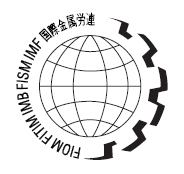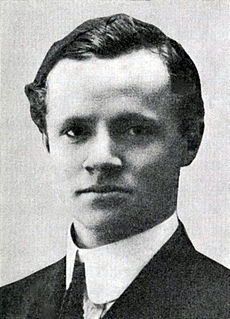
The Australian Labor Party is a major centre-left political party in Australia. The party has been in opposition at the federal level since the 2013 election. Bill Shorten has been the party's federal parliamentary leader since 13 October 2013. The party is a federal party with branches in each state and territory. Labor is in government in the states of Victoria, Queensland, Western Australia, and in both the Australian Capital Territory and Northern Territory. The party competes against the Liberal/National Coalition for political office at the federal and state levels. It is the oldest political party in Australia.

Anarcho-syndicalism is a theory of anarchism that views revolutionary industrial unionism or syndicalism as a method for workers in capitalist society to gain control of an economy and thus control influence in broader society. Syndicalists consider their economic theories a strategy for facilitating worker self-activity and as an alternative co-operative economic system with democratic values and production centered on meeting human needs.
The Labour Party is a social-democratic political party in the Republic of Ireland. Founded in 1912 in Clonmel, County Tipperary, by James Larkin, James Connolly, and William X. O'Brien as the political wing of the Irish Trades Union Congress, it describes itself as a "democratic socialist party" in its constitution. Labour continues to be the political arm of the Irish trade union and labour movement and seeks to represent workers interests in the Dáil and on a local level.

Nigeria Labour Congress (NLC) is an umbrella organization for trade unions in Nigeria. It was founded in 1978 following a merger of four different organisations: Nigeria Trade Union Congress (NTUC), Labour Unity Front (LUF), United Labour Congress (ULC) and Nigeria Workers Council (NWC). The numerous affiliated unions were restructured into 42 industrial unions. Its founding President was Wahab Goodluck.

The International Transport Workers' Federation (ITF) is a democratic global union federation of transport workers' trade unions, founded in 1896. In 2017 the ITF had 677 member organizations in 149 countries, representing a combined membership of 19.7 million transport workers in all industrial transport sectors: civil aviation, dockers, inland navigation, seafarers, road transport, railways, fisheries, urban transport and tourism. The ITF represents the interests of transport workers' unions in bodies that take decisions affecting jobs, employment conditions or safety in the transport industry.

The International Metalworkers' Federation (IMF) was a global union federation of metalworkers' trade unions, founded in Zürich, Switzerland in August 1893. As of 2009, the IMF had more than 200 member organisations in 100 countries, representing a combined membership of 25 million workers.
Anarchism in South Africa dates to the 1880s, and played a major role in the labour and socialist movements from the turn of the twentieth century through to the 1920s. The early South African anarchist movement was strongly syndicalist. The ascendance of Marxism–Leninism following the Russian Revolution, along with state repression, resulted in most of the movement going over to the Comintern line, with the remainder consigned to irrelevance. There were slight traces of anarchist or revolutionary syndicalist influence in some of the independent left-wing groups which resisted the apartheid government from the 1970s onward, but anarchism and revolutionary syndicalism as a distinct movement only began re-emerging in South Africa in the early 1990s. It remains a minority current in South African politics.

The Portuguese Socialist Party was a political party in Portugal.

Alfred Martin Madsen was a Norwegian engineer, newspaper editor, trade unionist and politician for the Norwegian Labour Party. He began as deputy chairman of their youth wing, while also working as an engineer. In the 1910s he rose in the hierarchy of the party press, and eventually in the Labour Party and the Confederation of Trade Unions as well. He was an important party and trade union strategist in the 1920s. He served six terms in the Norwegian Parliament, and was the parliamentary leader of his party for many years. He was twice a member of the national cabinet, as Minister of Social Affairs in 1928 and Minister of Trade from 1935 to 1939.
Trade unions in South Africa have a history dating back to the 1880s. From the beginning unions could be viewed as a reflection of the racial disunity of the country, with the earliest unions being predominantly for white workers. Through the turbulent years of 1948–1991 trade unions played an important part in developing political and economic resistance, and eventually were one of the driving forces in realising the transition to an inclusive democratic government.

The National Society of Operative Printers and Assistants (NATSOPA) was a British trade union.
The Industrial and Commercial Union (ICU) was a trade union and mass based popular political movement in southern Africa. It was influenced by the syndicalist politics of the Industrial Workers of the World, as well as by Garveyism, Christianity, communism and liberalism.
Social Democratic Union 'Proletarian' was a political party organization in Bulgaria 1906-1908. The organization was led by Dimitar Blagoev, who had been expelled from the Narrow Socialists for being an 'anarcho-liberal. 'Proletarian' merged with the Broad Socialists, and would represent the leftwing tendency within that movement from 1909 onwards
This is a list of members of the Australian Senate from 1904 to 1906. Half of its members were elected at the March 1901 election and had terms deemed to start on 1 January 1901 and finishing on 31 December 1906; the other half were elected at the 16 December 1903 election and had terms starting on 1 January 1904 and finishing on 30 June 1910, extended as a result of the 1906 referendum, which changed Senate terms to finish on 30 June, rather than 31 December. Parties reflect those acknowledged at the time of the 1904 election

Yanko Ivanov Sakazov was a Bulgarian socialist politician.
The International Socialist League of South Africa was the earliest major Marxist party in South Africa, and a predecessor of the South African Communist Party. The ISL was founded around the syndicalist politics of the Industrial Workers of the World and Daniel De Leon.

International Workers' Day, also known as Workers' Day, May Day or Labour Day in some countries and often referred to as May Day, is a celebration of labourers and the working classes that is promoted by the international labour movement which occurs every year on May Day, an ancient European spring festival.
The labour movement or labor movement consists of two main wings, the trade union movement or labor union movement, also called trade unionism or labor unionism on the one hand, and the political labour movement on the other.










